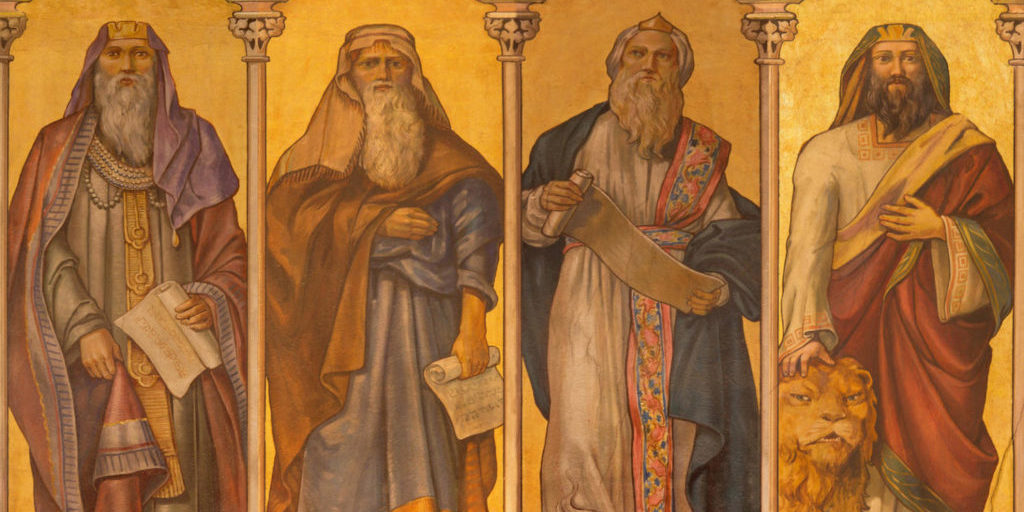
Introduction to the Major Prophets of the Old Testament
The major prophets in the Old Testament of the Bible refer to the books of Isaiah, Jeremiah, and Ezekiel (in chronological order). They are major because of the scope and size of these books. Like a movie or novel, the Bible has an overall plot structure; the major prophets must be located within this larger story.
Background and Context
The biblical story begins with the fact that there is only one God. He has created everything and especially made humankind to rule under him. In this context, God is the centre of the universe and we humans find our purpose in having a right relationship to God and to one another. The first man and woman, however, rejected this way. Now, what happens when God is no longer the centre of our universe? Who steps in to take his place? Why, we do. I want to be at the centre of the universe. Will this work? No, because you want to be there too. So, corruption and evil have reigned since the rebellion of Adam and Eve because we no longer had a right relationship with God and did not treat each other in genuinely human ways. There is only one test that proves deity and that is the ability to predict and to determine the future. This test remains true today. Click To Tweet
He made a fresh start with Abraham. He would restore both creation and humanity ruined by pride and rebellion using Abraham and his family as a pilot project. The people of Israel would be an example, a light to the world of what it meant to be properly related to God and to treat each other well according to the dignity of our humanity. We call this the Mosaic covenant, initiated in Exodus, expanded and renewed in Deuteronomy.
But the people of Israel did not keep the Mosaic covenant. They were to be blessed for obedience, cursed for disobedience. This is where the prophets enter the story: these men were like the best man or maid of honour at a wedding. They were witnesses to the original vows in the covenant between God and Israel, and they called Israel to turn away from covenant disloyalty in idolatry and injustice in human relations.
The early prophets did not write down their messages. Later on, a breaking point was reached in the covenant relationship between God and Israel. God would be faithful to his threats spelled out in the covenant and send the people away into exile. Fortunately, judgement was not the final word. God planned to restore his people after exile. There would be a new covenant between God and His people and this time, humans would be enabled to be faithful to the covenant relationship (Jer. 31). This plan had to be written down so that future generations of Israel would understand the circumstances of exile and the process of restoration.
Predictive Prophecy
The nations must believe that Yahweh is the only true God, that the gods worshipped by the various nations are really just no-names and nothings. Click To Tweet Books like Isaiah, Jeremiah, and Ezekiel contain predictions of the future for specific reasons. First, prediction of the future distinguished Yahweh from the idols worshiped by the nations surrounding Israel and by faithless Israelites. We can boil down and summarize the covenant relationship between Israel and Yahweh in two requirements: (1) love God, and (2) love your neighbour as yourself. Israel’s covenant violation was proven from idolatry (worship of other gods) and social injustice, i.e. instead of considering the interests of one’s neighbor and seeking to help the other person, one establishes a culture in society where one takes advantage of the other person in every possible way. Isaiah in particular seeks to discredit the idols worshipped by Israel by proving that they are not gods. This is the focus of Isa. 40–48. There is only one test that proves deity and that is the ability to predict and to determine the future. This test remains true today. No advances in our society in science and technology have enabled us to predict the future. This is why The Weather Channel is the most watched television channel in America. Only God can predict and control the future.
Prophetic predictions are given according to a method that is sound, or even scientific, so to speak. How does this work? Normally a prophet makes predictions of events to happen in the near future. When these predictions come true, then the prophet is given validation in his community that he is speaking for Yahweh and is a true prophet. Therefore, when this same prophet speaks about events to happen in the distant future, or at some unknown or unspecified point in the future, his hearers will believe that he is indeed speaking for Yahweh, and Yahweh will be attested as the one and only true god against all rivals.
Second, prediction of the future was necessary to explain the exile. Without the messages of the prophets the people might have concluded that the gods of the nations were more powerful than Yahweh, resulting in his people being captured and exiled by nations who served these more powerful gods.
Third, the prediction of the future shows that the plan of deliverance requires time. Isaiah shows that the return of the people to a right relationship to Yahweh would happen in two stages. First, the people would be released from physical exile in Babylon. Second, the people would be released from spiritual exile and slavery to sin. The first return, physical release from Babylon, would take seventy years according to Jeremiah. For 490 years the people had neglected to give the land its sabbaticals, and so they would be exiled, and the land would have its rest. Then it would actually take another seventy sabbaticals (490 years) to deal with their rebellion and sin and incorrigible covenant disloyalty (Dan 9). Finally, with the coming of the Messiah, Yahweh would circumcise their hearts and make a new covenant in which not only would he be faithful, but his people would be faithful too. They would receive the forgiveness of sins. The temple would be rebuilt, and God would once more return to live in the midst of his people as king. If the messages of the prophets were written down, these predictions would be their comfort and encouragement during the long weary years while God worked out his purposes and plan of salvation. The prophets wrote down their messages as proof of the reliability of the word of Yahweh for later generations who would eventually be part of the renewal of the covenant relationship. Click To Tweet
Fourthly, prediction of the future demonstrates the sovereignty of Yahweh over the nations. Not only do the people of Judah need to see it demonstrated and proven that Yahweh knows and predicts the future, but the nations need to see this. The Assyrians, for example, must come to the conclusion that it was not their military might and strategy that brought the downfall of Israel. It was due solely to Israel’s sin and covenant violation. They were just instruments in the hands of a God who is sovereign over all the nations. The nations must believe that Yahweh is the only true God, that the gods worshipped by the various nations are really just no-names and nothings. This explains the long passages in the prophets dealing with foreign nations surrounding Israel.
Fifthly, prediction of the future proves the trustworthiness of the word of Yahweh. Hence his people should believe his promises and his threats in the covenant. The entire section of Isaiah from chaps 28-37 is all about whether or not the people will believe and trust the word of Yahweh. The covenant is like a marriage relationship. How can two people continue in an intimate relationship of love when one person does not believe or trust what the other person says? This is the complete breakdown of such a relationship. Only when the people come to believe and rely upon the word of Yahweh, no matter how unlikely it may seem, can God and Israel have a covenant relationship of love, faithfulness and loyalty, obedience and trust. The prophets wrote down their messages as proof of the reliability of the word of Yahweh for later generations who would eventually be part of the renewal of the covenant relationship.
Recommended Resources
- Peter J. Gentry, How to Read & Understand the Biblical Prophets (Wheaton: Crossway, 2017).
- Jason S. DeRouchie, ed. What the Old Testament Authors Really Cared About: A Survey of Jesus’ Bible (Grand Rapids: Kregel, 2013).
- Eugene Merrill, Kingdom of Priests (Grand Rapids: Baker, 2008).
**The preceding material has been adapted from an essay written for TGC’s Concise Biblical Commentary series, Fred G. Zaspel, Project Editor.**

